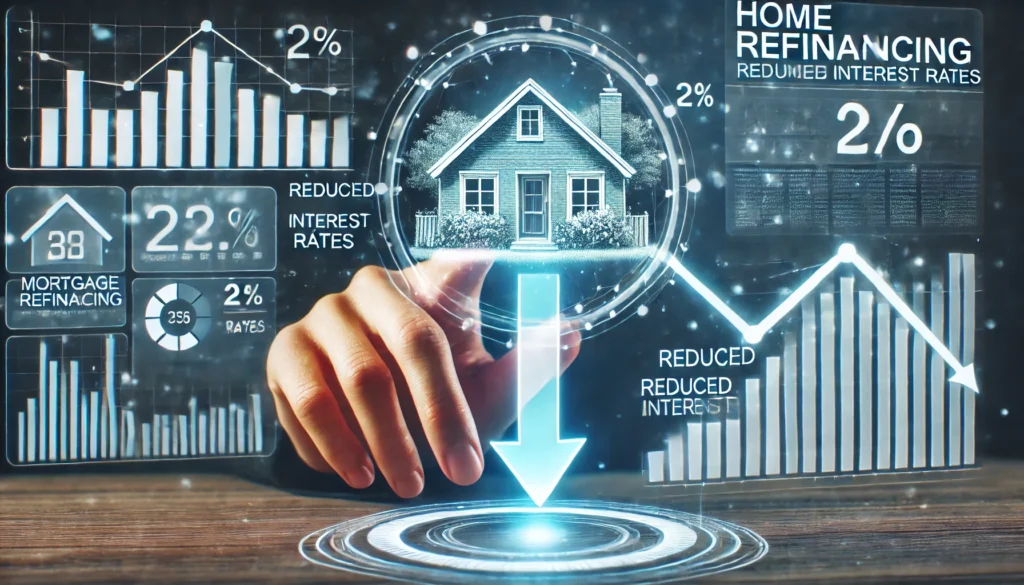Understanding Mortgage Refinancing and Its Financial Advantages
Refinancing a mortgage is a powerful financial strategy that has the potential to provide significant savings and long-term benefits. For homeowners looking to lower their monthly payments, reduce their interest rates, or consolidate debts, refinancing offers an opportunity to optimize their financial position. By exploring the benefits of refinancing, homeowners can make informed decisions that align with their personal and economic goals. However, navigating the refinancing landscape requires a strategic approach, as different refinancing options present unique advantages and considerations.
You may also like: Best Student Loan Refinance Options in 2025: Compare Rates & Save Thousands
One of the primary reasons homeowners choose to refinance is to secure a lower interest rate. A reduced rate can translate into substantial savings over the life of the loan, making it possible to allocate more funds toward other financial priorities. In addition, refinancing can provide the flexibility to switch loan terms, transitioning from a 30-year mortgage to a 15-year term, for instance, to pay off the loan faster and build equity more efficiently. While these benefits make refinancing an attractive option, understanding the nuances of loan terms, eligibility requirements, and closing costs is essential for maximizing financial gains.

The Benefits of Refinancing Home Loans in a Changing Economic Climate
Economic conditions, including interest rate trends and inflationary pressures, play a crucial role in determining the feasibility and desirability of refinancing. When interest rates drop, refinancing becomes particularly appealing, as homeowners can capitalize on the opportunity to lock in a lower rate. This advantage underscores one of the benefits of refinancing home loans, particularly in times of economic downturn or fluctuating market conditions.
A significant benefit of refinancing is the ability to convert an adjustable-rate mortgage (ARM) to a fixed-rate mortgage, providing predictability and stability in monthly payments. This shift is especially advantageous for homeowners who initially opted for an ARM but want to avoid the risk of rate increases over time. Additionally, refinancing can facilitate cash-out options, enabling homeowners to tap into their home equity to cover major expenses such as home renovations, education costs, or high-interest debt repayment.
While the advantages of refinancing are compelling, it is crucial to consider the associated costs, including closing fees, appraisal expenses, and potential prepayment penalties. Homeowners must carefully evaluate whether the long-term savings outweigh the upfront expenses, ensuring that refinancing aligns with their overall financial strategy. By conducting a thorough cost-benefit analysis, homeowners can confidently determine the best refinancing approach for their specific needs.
Refinancing Your Mortgage and Save Thousands Through Interest Rate Reduction
A primary motivation for refinancing is the potential to lower monthly mortgage payments through reduced interest rates. By securing a lower rate, homeowners can refinance their mortgage and save thousands over the life of their loan. For example, a 1% reduction in interest on a $300,000 mortgage can result in substantial long-term savings, making refinancing a financially savvy move.
Another compelling advantage of refinancing is the potential to eliminate private mortgage insurance (PMI). Homeowners who originally secured a loan with a low down payment may have been required to pay PMI, which adds to the overall cost of the mortgage. However, as home equity increases over time, refinancing can provide an opportunity to remove PMI requirements, further reducing monthly expenses.
In addition to lowering interest rates, refinancing allows borrowers to shorten their loan term, accelerating the payoff schedule. A 30-year mortgage refinanced into a 15-year term, for instance, may result in slightly higher monthly payments but significantly lower overall interest costs. This strategy benefits homeowners who are financially stable and seek to build equity faster while reducing total mortgage expenses.
Maximizing the Benefits of Refinancing Through Smart Financial Planning
Refinancing is not a one-size-fits-all solution, and homeowners should tailor their refinancing strategies to their unique financial situations. To fully leverage the benefits of refinancing home loans, borrowers must consider their credit scores, debt-to-income ratios, and future financial goals. A higher credit score increases the likelihood of securing favorable refinancing terms, making it imperative for homeowners to maintain strong credit profiles before applying for a refinance.
Timing also plays a crucial role in refinancing decisions. Borrowers should monitor interest rate trends and assess whether refinancing during a particular market cycle will yield optimal benefits. Consulting with financial advisors or mortgage professionals can provide valuable insights, ensuring that refinancing aligns with broader financial objectives.
Another consideration in refinancing is the choice between a cash-out refinance and a rate-and-term refinance. A cash-out refinance allows homeowners to access home equity, converting a portion of their home’s value into liquid funds. This option is beneficial for those seeking to finance major expenses or consolidate high-interest debts. However, it is important to weigh the risks of increasing the loan balance against the potential financial benefits.

Frequently Asked Questions (FAQ) on Refinancing and Its Benefits
1. What are the key benefits of refinancing your mortgage?
The benefits of refinancing your mortgage go beyond just lowering your interest rate. Refinancing can shorten your loan term, allowing you to build home equity faster and pay off your mortgage sooner. It also provides an opportunity to switch from an adjustable-rate mortgage (ARM) to a fixed-rate mortgage, ensuring more predictable monthly payments. Many homeowners use refinancing to consolidate debt, freeing up cash flow for investments or major expenses. By strategically managing your mortgage, you can unlock long-term financial advantages and reduce financial stress.
2. How can refinancing your mortgage save thousands over time?
One of the greatest advantages of refinancing your mortgage is the potential to save thousands in interest payments. By securing a lower interest rate, a homeowner can significantly reduce the amount paid over the life of the loan. Even a small reduction in interest rates can lead to substantial savings, especially for long-term loans. Additionally, refinancing can eliminate private mortgage insurance (PMI) if enough equity has been built, further cutting down monthly costs. Properly timed refinancing decisions can make a dramatic impact on your financial future.
3. When is the best time to consider refinancing your mortgage?
The best time to refinance depends on multiple factors, including current interest rates, your credit score, and financial goals. A good rule of thumb is to refinance when interest rates are at least 1% lower than your existing mortgage rate. Additionally, homeowners should consider refinancing when their credit score has improved, making them eligible for more favorable terms. Market trends and economic conditions can also influence the benefits of refinancing home loans. Timing your refinance strategically can maximize savings and improve overall financial stability.
4. How does refinancing your mortgage help improve financial flexibility?
Refinancing provides financial flexibility by lowering monthly payments and freeing up capital for other investments or expenses. Homeowners who refinance can use the extra cash to pay down high-interest debt, fund home renovations, or contribute to retirement savings. Additionally, refinancing to a longer loan term can reduce monthly financial strain while still allowing for extra payments when possible. The benefits of refinancing home loans include options tailored to both immediate financial relief and long-term wealth-building strategies. This flexibility makes refinancing an excellent financial tool for many homeowners.
5. What costs should you consider before refinancing?
While refinancing your mortgage can save thousands, it’s important to account for closing costs, which typically range from 2% to 5% of the loan amount. Some lenders offer no-closing-cost refinancing, but this often results in a slightly higher interest rate. Homeowners should evaluate how long they plan to stay in their home to determine if the upfront costs justify the long-term savings. Factoring in lender fees, appraisal costs, and title insurance ensures that refinancing remains a financially sound decision. A well-planned refinance minimizes costs while maximizing savings.
6. Can refinancing be beneficial even if you don’t lower your interest rate?
Yes, refinancing can still offer significant benefits even if interest rates remain the same. Homeowners may refinance to change loan terms, remove a co-borrower, or tap into home equity for major expenses. Refinancing can also help transition from an ARM to a fixed-rate mortgage, ensuring stable and predictable payments. Additionally, eliminating PMI through refinancing can reduce monthly costs, leading to long-term financial gains. The benefits of refinancing home loans extend beyond just securing a lower rate.
7. What role does credit score play in refinancing?
Your credit score plays a major role in determining whether you qualify for a refinance and what interest rates you receive. A higher credit score often translates to lower rates, reducing the overall cost of refinancing your mortgage and saving thousands over time. Homeowners with lower scores may still qualify but may face higher fees or stricter loan terms. Improving your credit score before applying for refinancing can increase eligibility for better rates and terms. Lenders assess credit history to determine financial responsibility, making a strong credit score a crucial factor.
8. How does refinancing affect home equity?
Refinancing can impact home equity in several ways depending on the type of refinance chosen. A cash-out refinance allows homeowners to access a portion of their home equity as cash, which can be used for renovations or investments. On the other hand, refinancing into a shorter-term loan increases equity buildup by paying down the principal faster. The benefits of refinancing home loans should be weighed against potential reductions in equity, ensuring financial goals align with refinancing strategies. Managing equity effectively through refinancing can provide both immediate and long-term financial advantages.
9. What are the risks of refinancing your mortgage?
Although refinancing can provide numerous benefits, there are risks that homeowners should consider. Extending a loan term may reduce monthly payments but increase total interest costs over time. Additionally, refinancing too frequently can lead to excessive closing costs that outweigh the benefits of refinancing. Locking into a fixed-rate mortgage during a declining interest rate market may also prevent homeowners from capitalizing on future rate drops. Carefully evaluating personal financial goals and market conditions can help mitigate risks and ensure a successful refinancing experience.
10. How can refinancing your mortgage help achieve long-term financial goals?
Refinancing your mortgage and saving thousands in interest payments can free up funds for long-term investments, retirement savings, or major life expenses. A lower monthly mortgage payment provides financial breathing room, allowing homeowners to allocate funds toward building wealth. Additionally, refinancing to a shorter loan term helps eliminate mortgage debt faster, increasing overall financial security. Strategically using refinancing as part of a financial plan can lead to significant economic benefits over time. The key is to align refinancing decisions with individual long-term financial objectives to maximize savings and stability.

Conclusion:
Mortgage refinancing offers a range of financial advantages, from lowering interest rates to increasing home equity and eliminating PMI. Homeowners who strategically approach refinancing can unlock significant savings, allowing them to refinance their mortgage and save thousands in the long run. However, refinancing is a complex financial decision that requires careful evaluation of loan terms, market conditions, and personal financial circumstances.
By understanding the benefits of refinancing, homeowners can make informed decisions that align with their financial goals. Whether the objective is to lower monthly payments, switch to a fixed-rate mortgage, or access home equity, refinancing can be a valuable tool for achieving financial stability and long-term savings. Consulting with mortgage professionals and financial advisors ensures that refinancing strategies are tailored to individual needs, maximizing the financial benefits of this powerful wealth-building strategy.
mortgage refinancing strategies, home loan refinancing benefits, interest rate reduction, financial planning for homeowners, mortgage loan terms, cash-out refinancing, private mortgage insurance removal, fixed-rate mortgage advantages, adjustable-rate mortgage risks, debt consolidation strategies, mortgage interest savings, refinancing eligibility, credit score impact on refinancing, cost-benefit analysis of refinancing, real estate financial planning, home equity optimization, smart refinancing tips, mortgage closing costs, loan term adjustments, homeownership financial strategies
Further Reading:
Benefits of Refinancing Your Mortgage in a Low-Interest Environment
Refinancing Your Home Loan: A Comprehensive Guide in 2024
What is Mortgage Refinancing? Benefits, Process and Tips
Legal Disclaimer
The information provided in this article is for general informational purposes only and is not intended to constitute financial, investment, legal, tax, or other professional advice. The content should not be relied upon for making any financial or investment decisions. Readers are encouraged to consult with licensed professionals, such as financial advisors, attorneys, or tax experts, to obtain personalized advice tailored to their individual circumstances. The author and publisher disclaim any liability for any actions taken or not taken based on the information provided in this article.





